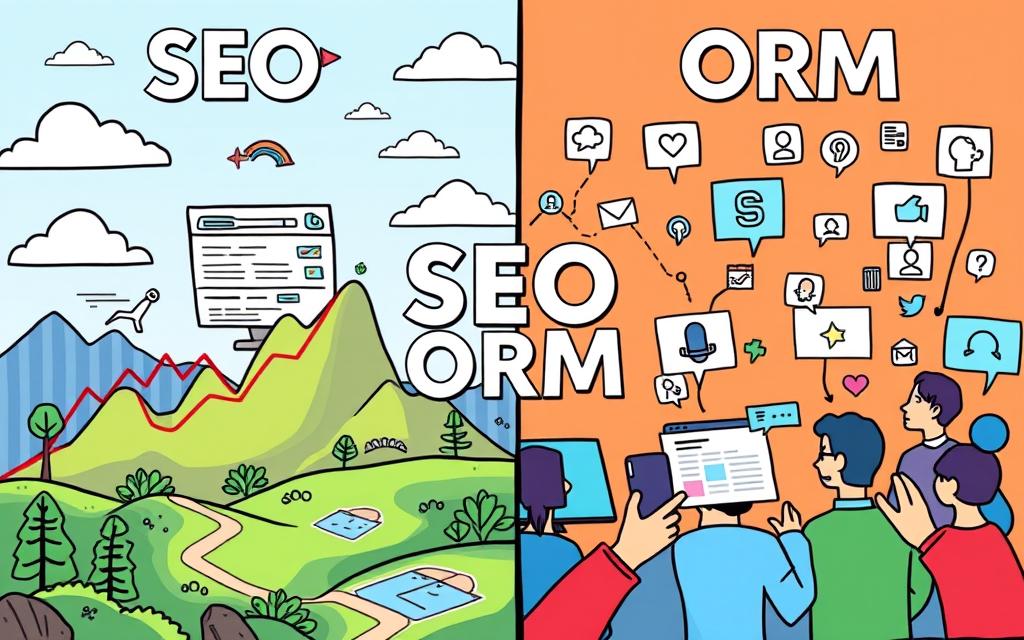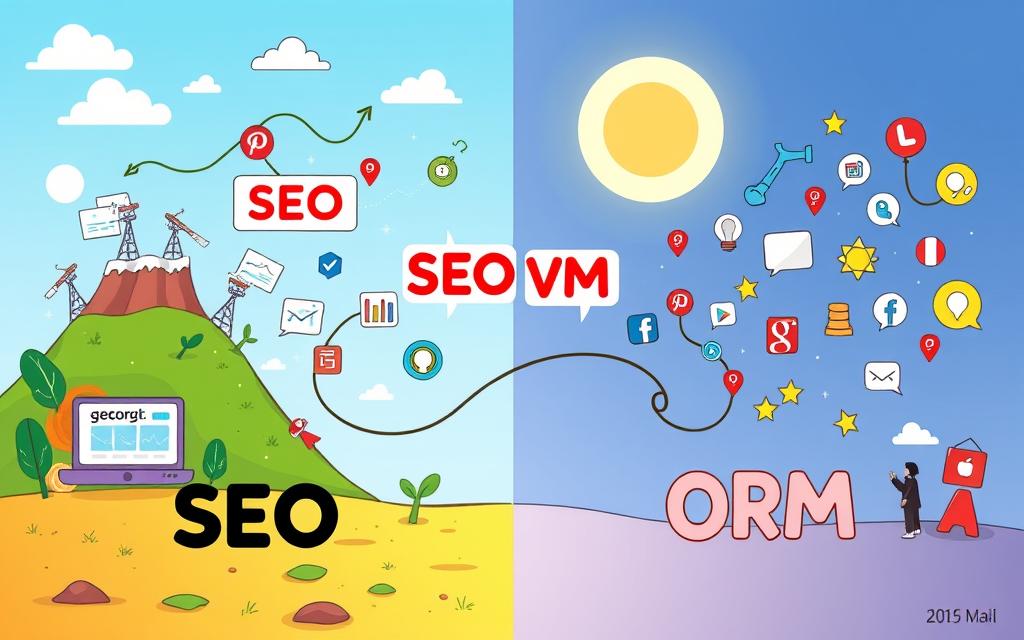As a business owner, you know how vital a strong online presence is. Search Engine Optimization (SEO) and Online Reputation Management (ORM) are key to this. They share some similarities but have different goals and methods.
SEO aims to make your website more visible in search results. This helps potential customers find your products or services. On the other hand, ORM manages your brand’s online image across many platforms, not just your website.
Knowing the differences between SEO and ORM helps you craft a better digital marketing plan. By using both, you can boost your search rankings and gain audience trust. This creates a positive online image that makes your business stand out.
Key Takeaways
- SEO and ORM have different goals, with SEO focusing on website visibility and ORM focusing on brand perception.
- ORM involves a multi-disciplinary approach, while SEO typically concentrates on a single website.
- Effective ORM campaigns incorporate SEO strategies to build a positive online reputation.
- ORM aims to improve reviews, ratings, and search results, while SEO primarily focuses on product and service searches.
- SEO and ORM work together, with ORM utilizing SEO to achieve its objectives.
Introduction to SEO and ORM
Defining Search Engine Optimization (SEO)
SEO, or Search Engine Optimization, is a way to make websites more visible online. It helps websites rank higher on search engines like Google. This makes it easier for people to find and interact with a brand.
Defining Online Reputation Management (ORM)
ORM, or Online Reputation Management, is about managing a brand’s image online. It includes things like online PR, content marketing, and social media. The goal is to keep the brand’s online image positive and true to its values.
SEO and ORM are closely linked. They work together to help brands succeed online. SEO definition and ORM definition may vary, but they’re essential for digital success.
Both SEO and ORM are key for brands. They help improve visibility, manage how people see the brand, and increase traffic. By combining these strategies, businesses can boost their online image, gain trust, and keep a good reputation.
| SEO Strategies | ORM Strategies |
|---|---|
|
|

“SEO’s primary goal is to increase visibility on search engines like Google, while ORM complements this by managing presence on review sites and other platforms.”
Combining SEO and ORM strategies is vital. It helps businesses stay strong online, manage their reputation, and grow in the digital world. Questions? Ask for a free consultation.
Key Differences Between SEO and ORM
SEO and ORM might seem alike at first, but they’re not. They have different focuses and goals. Knowing these differences helps businesses use both strategies well and boost their online image.
Focus: Website Visibility vs. Brand Perception
SEO aims to make a website more visible in search results. This helps potential customers find it easily. ORM, however, works on improving how people see a brand online. It manages the brand’s reputation across different platforms.
Goal: Increasing Traffic vs. Building Trust
SEO’s main goal is to bring more people to a website. It hopes to turn these visitors into leads and sales. ORM, though, focuses on building trust and credibility. It wants to influence people’s choices by managing the brand’s online image.
SEO and ORM use different tactics. SEO uses competitive keyword strategies. ORM, however, is more about managing a brand’s online presence and how it’s seen by others.
| Metric | SEO | ORM |
|---|---|---|
| Focus | Website visibility | Brand perception |
| Goal | Increasing website traffic | Building trust and credibility |
| Approach | Competitive keyword optimization | Tailored to the brand/company |
Understanding the differences between SEO and ORM helps businesses create a strong digital marketing plan. This plan uses the best of both strategies to improve their online presence and reputation.

orm seo
Online reputation management (ORM) and search engine optimization (SEO) are closely linked. They work together to boost a brand’s online image. SEO helps make a brand’s website and content more visible to potential customers.
ORM and SEO share common goals. ORM aims to build and manage a brand’s reputation. SEO works to make a brand more visible online. By using good SEO, businesses can improve their reputation and attract more customers, building trust and loyalty.
Here are some key statistics:
- 58% of adults in the US consider a company’s reputation a major factor when deciding to purchase a product or service.
- 9 out of 10 users do not click beyond the first page of Google search results, highlighting the importance of good SEO for businesses.
- 99% of consumers consider user-generated content before making a purchase decision.
These numbers show how important it is to use both ORM and SEO together. By responding to reviews, encouraging positive feedback, and using SEO, businesses can create a strong online presence. This attracts and keeps customers.
“Good online reputation is essential for businesses to rank higher on search engine results pages (SERPs) and attract more customers.”
In summary, ORM and SEO are key strategies for a brand’s online success. By optimizing their website and content, businesses can become more visible and trustworthy. This leads to more customer loyalty and success.

SEO as a Component of ORM
Search Engine Optimization (SEO) is key to any online reputation management (ORM) plan. It helps make your website and content more visible. This way, positive info about your brand shows up first in search results.
SEO uses tactics like keyword optimization and link building. These help ensure good info about your brand tops search results. Without a solid SEO plan, your ORM efforts might not work well.
- Every second, 67,921 people search online for info, and 93% of online activities start with a search.
- About 80-90% of people read online reviews before buying, making ORM vital for sales.
- SEO makes websites show up higher in search results, boosting your brand’s visibility and reputation.
Adding SEO to your ORM plan makes sure your brand’s best info is easy to find. This builds trust and helps manage risks. It also makes your online image match your brand’s values.
“SEO is a crucial component of any successful ORM campaign, as it helps improve the visibility and ranking of positive content about a brand online.”
The role of SEO in ORM is huge. By optimizing your online presence, you control your brand’s story. This ensures your reputation matches your business goals.

The Role of Content in SEO and ORM
Content is crucial for both SEO and ORM. It helps your website show up more in search results. This brings in more visitors and potential customers. It also helps build a good online image by fixing bad mentions and showing off your brand’s good sides.
Creating SEO-Friendly Content
To make content SEO-friendly, use the right keywords and optimize your meta tags. Make sure your content is both useful and fun for your audience. This improves your search rankings and makes users happy, leading to more time spent on your site.
Content for Building Online Reputation
Content is essential for a good online reputation. Create content that meets your audience’s needs and shows your brand’s value. This could be blog posts, case studies, or testimonials that show your brand’s strengths.

The role of content in SEO and ORM is huge. A good content strategy helps you be seen more online, build trust, and grow your business.
| Key Statistic | Insight |
|---|---|
| About 95% of consumers read online reviews before buying a product. | The importance of managing your online reputation through content is clear, as the majority of consumers rely on reviews to inform their purchasing decisions. |
| Over 81% of consumers are likely to read Google Reviews before visiting a physical business. | Businesses must focus on generating and responding to online reviews, as they significantly impact consumer behavior and brand perception. |
| It is crucial to monitor social engagement by checking the number of followers on each platform, response times to comments and messages, and the sentiment of conversations about your brand on social media. | Actively managing your social media presence and engagement is a key aspect of effective online reputation management. |
Tracking and Monitoring in SEO and ORM
SEO and ORM need constant tracking and monitoring to see how well they work. By watching key metrics, you learn a lot and make smart choices. This helps you improve your strategies and get better results.
SEO Performance Metrics
For SEO, important metrics to watch include:
- Website traffic: Keep an eye on who visits your site and how they act.
- Search engine rankings: See how you rank for your keywords and watch for changes.
- Conversion rates: Check if your site is turning visitors into leads or customers.
By watching these SEO metrics, you can find what needs work. Then, you can make your content and plans better. This ensures your SEO efforts really pay off.
ORM Performance Metrics
For ORM, key metrics to track are:
- Online mentions: Watch how often and what people say about your brand online.
- Online reviews: Keep track of what customers say about you and fix any bad reviews fast.
- Brand sentiment: See how people feel about your brand and spot any reputation risks.
Tracking these ORM metrics helps you manage your online image. You can fix problems and use chances to make your brand look better.
| Metric | Importance for SEO | Importance for ORM |
|---|---|---|
| Website Traffic | Shows if your SEO is bringing in the right visitors. | Shows how interested people are in your brand. |
| Search Engine Rankings | Higher rankings mean more people see your site. | Good rankings make your brand seem trustworthy. |
| Conversion Rates | Shows if your SEO is turning visitors into customers. | High conversion rates mean your brand meets customer needs. |
| Online Mentions | Helps find chances to promote your brand. | Let’s you fix any bad mentions fast. |
| Online Reviews | Good reviews help your site rank higher. | Managing reviews builds trust and keeps your reputation good. |
| Brand Sentiment | Helps shape your SEO and content. | Helps spot and fix any bad feelings about your brand. |
By tracking these metrics for SEO and ORM, you understand your online presence better. This lets you make smart choices and improve your digital marketing for lasting success.
Building Backlinks for SEO and ORM
Building quality backlinks is key for online reputation management (ORM) and search engine optimization (SEO). Backlinks from other reputable sites boost your online presence and credibility.
For SEO, backlinks from trusted sources tell search engines your site is reliable. This can make your site more visible, bringing in more organic traffic. It also helps your search engine ranking.
In ORM, backlinks help spread your positive content and reduce negative mentions. Getting links from respected sites makes your brand look credible. This builds trust with your audience.
- Prioritize quality over quantity when building backlinks – focus on securing links from authoritative, relevant websites.
- Engage with industry influencers and create valuable, shareable content to increase the likelihood of earning backlinks.
- Utilize tools like LinkGraph and Performance Reputation to track and analyze your backlink profile, identifying opportunities for improvement.
- Avoid common mistakes like buying backlinks or relying solely on quantity, as this can harm your online reputation and search engine rankings.
Building a strong backlink profile is vital for SEO and ORM. By getting high-quality backlinks, you boost your online presence, credibility, and reputation.
“Quality backlinks from reputable sources are essential for a strong online reputation.”
Effective keyword optimization is also crucial for SEO strategies in online reputation management. It helps improve search engine rankings and visibility. Link building is a key SEO tactic for ORM. It establishes credibility, authority, and a strong online presence, improving reputation and search rankings.
Handling Negative Content in ORM
Keeping a good online reputation is key for businesses. But dealing with negative content is tough. Ignoring bad feedback can harm a brand’s image and reputation. So, managing negative reviews and content, addressing negative online mentions, and using techniques for handling negative information are vital for good Online Reputation Management (ORM).
One important step in ORM is identifying and addressing negative reviews. Generic responses can seem fake and don’t help. Businesses should aim to respond in a professional and caring way. They should listen to the customer’s problem and offer a fix. Getting help from crisis managers or PR experts can help make the right decisions.
It’s also key to tackle the root causes of negative feedback. Keeping an eye on online mentions with tools like Google Alerts is important. Using SEO tactics to push down negative search results and highlight positive content can also boost a brand’s image.
| Key Strategies for Handling Negative Content in ORM | Benefits |
|---|---|
| Responding professionally to negative reviews | Demonstrates customer-centricity and a commitment to resolving issues |
| Leveraging social proof (e.g., customer testimonials, awards) | Enhances brand credibility and trustworthiness |
| Actively soliciting positive feedback from satisfied customers | Helps bury negative comments and provides a more balanced online presence |
| Creating SEO-optimized content to push down negative search results | Improves the visibility of positive brand information in search engine results |
The importance of responding to negative content is huge. By tackling and managing negative reviews and mentions, businesses can lessen the harm to their online image. This helps build a stronger, more reliable brand.
“Neglecting negative feedback can lead to irreparable damage to a brand’s identity and reputation.”
Local SEO and Local ORM
As a business owner, your online presence is key to attracting and keeping customers. Local SEO and ORM (Online Reputation Management) help make your brand known and respected in your area.
Local SEO makes your website and online listings more visible in local searches. This means optimizing your Google My Business profile and using local keywords. It also includes getting listed on local directories. This way, more people can find you and are more likely to buy from you.
Local ORM is about managing how people see your brand in your community. It’s about watching and answering reviews, fixing any bad feedback, and making a good impression on social media. Reviews are very important, as 96% of people read them before buying, and 86% trust them to build trust.
| Local SEO | Local ORM |
|---|---|
|
|
By combining local SEO and ORM, you can boost your brand’s visibility and reputation in your area. This approach helps more people find you and builds trust, leading to more sales and success.
“Businesses with four or more negative articles on the first page risk losing up to 70% of prospective customers.”
In today’s digital world, being seen and respected online is crucial. By focusing on local SEO and ORM, your brand can stand out and connect with your local audience.
The Role of Social Media in SEO and ORM
Social media is now key for both SEO and ORM. It greatly affects how people see your brand online. This includes your brand’s visibility, trustworthiness, and how others view you.
Social media helps SEO by sharing relevant content. When you make content that people want to share, your site gets more views. Also, being active online can lead to more backlinks and visitors, which helps your SEO.
In ORM, social media is great for keeping an eye on what people say about you. By quickly responding to feedback, you can manage your reputation well. Studies show that fixing negative feedback fast can make customers more loyal by 70%.
To use social media well for SEO and ORM, follow these tips:
- Make sure you have a strong social media presence where your audience is most active.
- Share high-quality, engaging content that fits your brand and interests your followers.
- Watch your online mentions and reviews on social media and answer any concerns quickly.
- Use social media analytics to track your content’s performance and adjust your plan as needed.
- Link your SEO and social media efforts by using the right keywords and getting backlinks from social sites.
By using social media wisely, you can make your brand more visible, trusted, and well-liked online. This will help your SEO and ORM efforts a lot.
“Successful brands today understand the importance of aligning their social media and SEO strategies to create a seamless online presence and reputation management.” – Marketing Strategist, XYZ Agency
Integrating SEO and ORM Strategies
Building a strong online presence requires combining SEO and ORM tactics. SEO boosts your positive content’s visibility. ORM helps manage your online image and tackle negative views.
The benefits of integrating SEO and ORM are many. It boosts your brand’s trust and credibility. It also increases traffic and search rankings, leading to better customer loyalty.
Research shows that 85% of consumers trust online reviews as much as personal recommendations. Also, nearly 3 out of 4 consumers trust a company more if it has positive reviews.
To get the best results, you need to align your SEO and ORM strategies. This means:
- Optimizing your website content with relevant keywords to improve search engine visibility
- Actively managing your online reputation by monitoring and responding to customer reviews and feedback
- Creating high-quality, shareable content that builds brand authority and trust
- Leveraging social media to engage with your audience and promote positive brand messaging
- Utilizing local SEO tactics to connect with your target audience in your geographic area
By integrating SEO and ORM, you can create a powerful synergy. This synergy helps you stand out online and build a strong, trusted brand.
| SEO Tactics | ORM Tactics |
|---|---|
| Keyword optimization | Reputation monitoring |
| Improving website structure and content | Responding to reviews and feedback |
| Building high-quality backlinks | Promoting positive brand messaging |
| Leveraging local SEO | Addressing negative content |
“Combining SEO and ORM strategies is essential for building a strong online presence and reputation. By aligning these two disciplines, you can unlock a powerful synergy that will help your brand stand out and thrive in the digital landscape.”
Case Studies: Successful SEO and ORM Campaigns
Using SEO and online reputation management (ORM) together can lead to great results. Let’s look at some real examples that show how this combo works well.
A top brand used content creation, backlinks, and reviews to boost its online image. By mixing SEO with ORM, it pushed down bad mentions and highlighted the good. This made it a top name in its field.
Another example is a company hit by bad online comments. It used a detailed ORM plan that included SEO to fight back. By keeping a close eye on its online image and making smart changes, it won back its audience’s trust.
“Integrating SEO and ORM is a game-changer for businesses that want to proactively manage their online reputation and stay ahead of the competition.”
The secret to these wins was being able to change and improve their plans. By watching how things went and tweaking their SEO and ORM, these brands kept their online image strong.
These stories show that SEO and ORM work for many fields, not just one. Whether you’re a person or a company, using these strategies can help you be seen more online, manage your image, and succeed in the long run.
Leveraging Reverse SEO for ORM
In today’s online world, keeping your brand’s reputation in check is key. A strong strategy is using reverse SEO for online reputation management. This method aims to push down bad content and highlight the good about your brand.
Techniques like making new social media profiles and posting interesting content can help. They also involve smart use of keywords. This way, you can hide or reduce the bad and make the good stand out. By managing your online image well, you can influence how people see and think about your brand.
Reverse SEO is vital when a single bad mention can harm your reputation a lot. By using these techniques for leveraging reverse SEO in ORM, you can fight off bad online content. This helps improve your online reputation.
“Reverse SEO is essential for managing online reputation, countering negative search results, and promoting positive content.”
Understanding how reverse SEO can improve online reputation is crucial. It means finding and fixing the problems that cause bad online content. At the same time, you boost your brand’s good stories through smart using reverse seo for reputation management.
By using reverse SEO, you can lessen the harm of bad online content. This makes your brand look trustworthy and respected. Start using this powerful tool to manage your online image today.
| Technique | Description |
|---|---|
| Parasite SEO | Utilizing large, authoritative websites to build pages that inherit the root domain’s ranking signals and outrank negative content. |
| Google My Business Optimization | Enhancing your Google My Business listing with detailed information, product listings, and images to boost trust signals. |
| Reputation Management | Removing or addressing negative online reviews and content through established processes and platforms. |
| Social Media Engagement | Leveraging social media platforms to promptly respond to PR crises, reassure customers, and rebuild trust. |
Conclusion
In conclusion, this article has looked at the main similarities and differences between SEO and ORM. It showed how these two areas can help improve a brand’s online image and reputation. SEO works on making websites more visible and attracting more visitors. ORM, on the other hand, focuses on managing how people see a brand online and building trust with customers.
By combining these strategies, brands can make positive content more visible. At the same time, they can handle negative comments and shape the online story. This mix of SEO and ORM is key for businesses wanting a strong, reliable, and trustworthy online presence.
The article also stressed the importance of using both SEO and ORM together. This is crucial for businesses aiming to grow their online presence and keep a good brand image. It’s all about taking a complete approach that uses both strategies for the best results.

